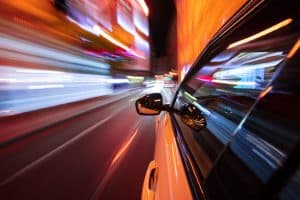Share This Article
What Is Fear of Driving or Vehophobia?
Having the ability to get in a car and drive to your destination is a freedom most of us take for granted. Unfortunately, some of us have a debilitating fear that can hamper this simple freedom.
The fear of driving may be powerful enough to limit or even prohibit some from driving at all. Let’s go through the fear and phobia known as vehophobia. Maybe with simple knowledge and discussion we can work through the issues and put the fear in our rear view mirror.
Vehophobia refers to the fear of driving as well as sensations or places associated with driving.
As a result, there is some overlap between vehophobia and other phobias. For example, one way vehophobia can manifest is a fear of being trapped in the small confines of a car and not being able to escape due to traffic. If you think that sounds a bit like claustrophobia, you would be correct.
A fun way to remember how to pronounce vehophobia: Vee-Ho-Fo-Bee-Ha

Other sufferers find themselves unable to even get behind the wheel of a car without freezing with fear. However, it is vital to note that vehophobia can manifest in many forms. It does not necessarily need to involve a fear of small, confined places, or being “trapped” somewhere and being unable to get out, or any PTSD or previous accidents or bad experiences with cars. Panic attacks are a common manifestation of vehophobia.
Some of the most common fears that manifest as vehophobia include:
- The fear of getting into another accident, if an accident is indeed the trigger.
- Severe anxiety to the point where you are unable to drive or even potentially move while behind the wheel.
- Fearing the fear. Vehophobia can manifest being afraid of being afraid, and that and the resultant panic attack while driving may cause another accident.
- The fear that their driving may cause harm to another person, especially a loved one.
Many Struggle with Vehophobia
If you suffer from vehophobia, it can be all too easy to feel silly, isolated, or alone. After all, whoever heard of being afraid of driving? You must be the only person weak enough to feel this way, right?
Well, it isn’t silly. You’re not weak. And you’re not alone. According to one study, as many as 25 to 30 percent of those involved in accidents experience some form of PTSD within the first thirty days of the accident.
Why does that matter?
Because all too often, we take numbers to mean power or legitimacy. If one or two people fear something, we ostracize them and call them weak or cowards (which does nothing to help their plight). If there are many people with the same fears and conditions, however, suddenly society has an easier time taking them more seriously.

What’s more, with more people comes more data, which in turn means a better chance of treating or even curing the condition. As more people come forward about vehophobia, we have a better chance of treating it.
Five Basic Statistics of Vehophobia
Prevalence: Studies indicate that up to 12.5% of U.S. adults may experience a driving phobia or anxiety about specific driving situations to some extent during their lifetime. This percentage can vary based on the population and methodology of the study.
Types of Driving Fears: Common fears associated with driving include fear of getting into an accident, driving at high speeds, driving over bridges, and driving in heavy traffic. These specific fears can vary widely in intensity among those who experience vehophobia.
Impact on Driving Frequency: Many individuals with vehophobia may avoid driving altogether or restrict themselves to certain routes or conditions. This can lead to a decrease in quality of life and increased reliance on public transportation or others for rides.
Gender Differences: Some studies suggest that vehophobia may be more common in women than in men, though the severity and specific fears might differ. However, cultural, social, and psychological factors can influence these findings.
Treatment and Improvement: Cognitive-behavioral therapy (CBT) and exposure therapy have shown effectiveness in treating vehophobia, helping individuals gradually overcome their fears through structured support and coping strategies. Success rates can vary, but many people report significant improvements in confidence and reduced anxiety levels.
Causes of Fear of Driving or Vehophobia
As mentioned above, there are several potential causes of vehophobia.
While it is not a universal cause, vehophobia is most commonly found in those who have been in an accident in the past. In these cases, a PTSD-esque mental association is made between that catastrophe and sitting in a car. In addition, if you suffer from other conditions which may overlap with vehophobia (e.g., claustrophobia) one condition can trigger or exacerbate the other.
In addition to causes born of suffering an accident or a related condition, some other potential triggers include:
- Being the witness of an accident.
- Childhood fear of cars.
- Extreme aversion to driving in intense conditions such as heavy rain or snow.
- A fear of driving near water, cliffs, or other areas you associate with accidents.
- A fear of driving on the highway due to high speeds, traffic, accidents, an inability to leave your car, and so on.
- Having been yelled at or otherwise severely reprimanded by a driving instructor or passenger.
- Seeing large animals run in front of your car and/or being afraid of hitting them.
- Being around overly aggressive drivers.
Symptoms of Vehophobia
Depending on the nature of your vehophobia and what your triggers are, you may suffer from any number of symptoms, including but not limited to:
- Shaking
- Sweating
- Sharp, shallow breaths
- Extreme tension resulting in chest tightness, elevated heart rate, muscle pain, and so on
- Nausea
- Panic attacks
In addition, there are more psychological symptoms of vehophobia. For example, if you are constantly looking for an excuse to get out of driving, even when it’s a short or simple trip to a location a few minutes away, vehophobia may be a factor.
Limitations Imposed by Vehophobia
While a fear of driving may not seem like a big deal to the rest of us, for those who suffer from it, vehophobia can impose some crippling life limitations. Most obviously, it makes driving next to impossible. This can deal a serious blow to your livelihood and lifestyle. What’s more, in a city with poor public transportation and a high ratio of drivers such as Los Angeles, it can make it hard to get around.
All of this can cause a great deal of anguish and make you feel isolated and miserable.

Vehophobia Treatment
So, vehophobia is clearly a troubling condition. But you ask how to get over fear of driving?
PROVEN SELF HELP PROGRAM FOR THE FEAR OF DRIVING CLICK HERE
One method of self-treatment for vehophobia is to simply conquer your fear head-on. Get behind the wheel, and retrain your brain to not be afraid of driving. Of course, this is far easier said than done, and nobody should pressure you to do this if you aren’t ready. (In fact, doing so will likely only make your vehophobia worse.)
If you are looking for a more controlled form of self-treatment, you may want to consider taking a course in defensive driving. One of the main causes of vehophobia is a sense of helplessness and exposure while driving. Defensive driving courses can help you feel more “in control” while behind the wheel, which in turn can help mitigate your vehophobia.
If you are looking for a more professional approach, you may want to consider therapy. Talking through a phobia with someone who you can trust can be extremely cathartic, and this is true of vehophobia as well. This can be especially helpful if you suffer from PTSD or the root cause of your vehophobia was an accident. A trained therapist can help you unpack the feelings and psychological links you have formed in the wake of your accident, thereby helping you come to grips with and ultimately conquer them.
Therapists can also make facing your fear head-on easier. They can guide you through the process, slowly getting you reacquainted with your car and the process of driving, helping you unpack your feelings and remain at ease the whole time. This is known as prolonged exposure therapy, and it along with your therapist’s support can be a game changer.
If you suffer from extreme tension and anxiety, you may want to consider hypnotherapy. The effectiveness of these treatments vary from person to person, so you’ll want to get the opinion of a doctor or therapist first.
Your doctor or therapist may also prescribe medication to help you control your anxiety. Beta blockers and sedatives are two commonly prescribed medications for vehophobia.
While further trials are required to establish its efficacy, there have also been some promising signs that virtual reality can be used to treat the condition.
Finally, as alluded to above, you are not alone. There is strength in groups, and a support group can be a great way to help conquer your fear of driving. Meeting and talking to people with similar fears and experiences with vehophobia can help you break the sense of isolation and shame that accompanies the condition as you strive to conquer your fear.
List of Common Driving Fears
- Fear of driving on highways
- Fear of driving on bridges
- Fear of driving alone
- Fear of driving after an accident
- Fear of learning to drive
- Fear of driving in snow
- Fear of driving at night
- Fear of driving on the interstate
- Fear of driving in the rain
- Fear of driving down steep hills
- Fear of driving near cliffs
- Fear of driving next to big trucks



